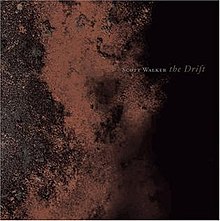| The Drift | ||||
|---|---|---|---|---|
 | ||||
| Studio album by | ||||
| Released | 8 May 2006 | |||
| Recorded | June 2004 – November 2005 | |||
| Studio | Metropolis Studios, Chiswick, London, and AIR Studios, Hampstead, London | |||
| Genre | ||||
| Length | 68:48 | |||
| Label | 4AD | |||
| Producer | Scott Walker, Peter Walsh | |||
| Scott Walker chronology | ||||
| ||||
The Drift is the thirteenth solo studio album by American singer-songwriter Scott Walker, released on 8 May 2006 on 4AD. Apart from composing the soundtrack to the film Pola X, the album was Walker's first studio album in eleven years and only his third studio album since the final disbanding of The Walker Brothers in 1978. Walker composed the songs for the album slowly over the decade after the release of 1995's Tilt,[4] beginning with "Cue" (the longest song to complete), up until the album's recording. An early version of "Psoriatic" was premiered at the Meltdown festival on 17 June 2000 under the title "Thimble Rigging".
The album was recorded over a period of 17 months at Metropolis Studios in Chiswick, London, with orchestra recorded in one day at George Martin's AIR Studios in Hampstead, London. Receiving positive reviews from critics before its release, the album was released as an LP and CD in May 2006. The artwork for the album was designed by Vaughan Oliver at v23 with assistance from Chris Bigg and photography by Marc Atkins.
- ^ Murray, Noel (December 6, 2012). "Navigating the diverse, difficult musical career of Scott Walker". The A.V. Club. Retrieved August 13, 2018.
As for fans of the intense avant-garde exercises of Tilt and The Drift...
- ^ Dennis, Jon (March 5, 2014). "10 of the best: Scott Walker". The Guardian. Retrieved August 13, 2018.
Tilt (1995), the first of his trilogy of experimental albums
- ^ Frank Deserto. October 31, 2017. 40 Years of Goth: Essential Albums from the Genre's Beginnings Archived 2019-01-19 at the Wayback Machine. Post-Punk.com.
- ^ Williams, Lewis (2006). Scott Walker - The Rhymes of Goodbye (1st ed.). London: Plexus. p. 179. ISBN 0-85965-395-1.